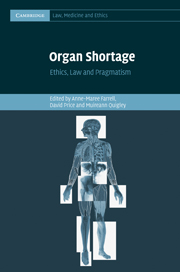Book contents
- Frontmatter
- Contents
- List of figures
- List of tables
- Contributors
- Acknowledgements
- List of abbreviations
- Table of cases
- Table of legislation
- Part I Setting the scene
- Part II Current issues affecting organ shortage
- 3 Organ donation and transplantation: meeting the needs of a multi-ethnic and multi-faith UK population
- 4 Educating the public to encourage organ donation?
- 5 Bereavement, decision-making and the family in organ donation
- Part III Strategies for addressing organ shortage
- Part IV Comparative perspectives
- Part V Current reform and future challenges
- Bibliography
- Index
- References
3 - Organ donation and transplantation: meeting the needs of a multi-ethnic and multi-faith UK population
from Part II - Current issues affecting organ shortage
Published online by Cambridge University Press: 29 March 2011
- Frontmatter
- Contents
- List of figures
- List of tables
- Contributors
- Acknowledgements
- List of abbreviations
- Table of cases
- Table of legislation
- Part I Setting the scene
- Part II Current issues affecting organ shortage
- 3 Organ donation and transplantation: meeting the needs of a multi-ethnic and multi-faith UK population
- 4 Educating the public to encourage organ donation?
- 5 Bereavement, decision-making and the family in organ donation
- Part III Strategies for addressing organ shortage
- Part IV Comparative perspectives
- Part V Current reform and future challenges
- Bibliography
- Index
- References
Summary
Inequalities exist in transplant services in the United Kingdom (UK), affecting minority ethnic groups in particular. The solutions to rectifying this situation are complex and require a holistic approach that considers both the short-term requirement to increase the number of organ donors from minority ethnic groups, and the longer-term focus to decrease the number of minority ethnic patients requiring a transplant, via preventative strategies. Focusing on disease prevention is important because the human and financial burden of not addressing these inequalities utilising a ‘whole-systems’ care pathway approach must be considered.
The previous UK government's seminal report, Tackling Health Inequalities: 10 Years On, published in 2009, reminded us not only that health gaps do still exist in the UK but are, in some cases, growing ever wider. The report stated: ‘We recommend that the needs of minority ethnic groups are specifically considered in the development and implementation of policies aimed at reducing socioeconomic inequalities.’ This statement reflects the shift in the focus of policy during the last twenty years, in which there has been a growing interest in the health of minority ethnic populations in the UK. Throughout this period, the provision of transplant services for minority ethnic groups has become a particularly important area of debate. This is in part due to the realisation of high rates of end-stage renal failure (as a result of diabetic nephropathy) among South Asian and African-Caribbean populations and the disproportionately higher numbers of South Asians and African-Caribbeans represented on transplant waiting lists.
- Type
- Chapter
- Information
- Organ ShortageEthics, Law and Pragmatism, pp. 37 - 51Publisher: Cambridge University PressPrint publication year: 2011



